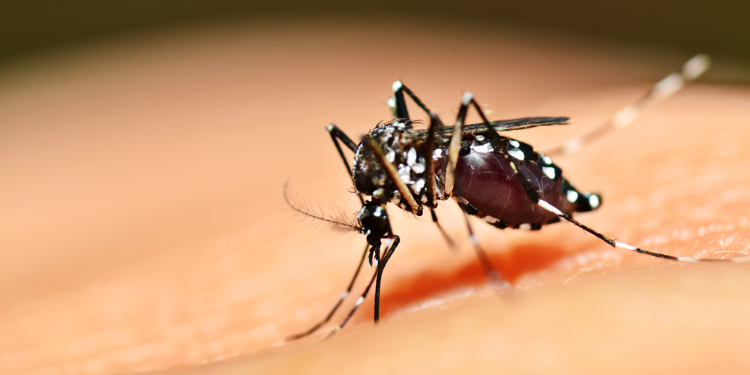
Despite a decrease in Dengue fever cases during the COVID-19 pandemic, there has been a resurgence since 2023. This increase has caused outbreaks in countries that were previously unaffected, sparking concern among people considering a move abroad.
Dengue epidemic: Global overview
The World Health Organization (WHO) published a map at the end of 2023 illustrating Dengue cases, highlighting numerous affected countries (data from November 2022 to November 2023). South America is the region with the highest number of affected countries and cases. Brazil, Colombia, Peru, Ecuador, Paraguay, and Argentina have a record of over 100 cases of Dengue per 100,000 people. In North America, only Mexico shows similar figures. While Central and South America report lower numbers (ranging from 0.01 to 0.99 cases per 100,000 people), the United States remains cautious.
Southeast Asia also faces a significant challenge with the epidemic. Thailand, Laos, Vietnam, and Malaysia each have a record of over 100 cases of Dengue fever per 100,000 people. The numbers are slightly lower in Indonesia, ranging from 10 to 99 cases per 100,000 people. The epidemic similarly affects India, Australia, Ethiopia, and Chad. Dengue has also emerged in China, France and its overseas territories, Italy, and Egypt (with cases ranging from 0.01 to 0.99 per 100,000 people). Cases have also been reported in Fiji, the Solomon Islands, Somalia, Saudi Arabia, Oman, Qatar, Yemen, and the United Arab Emirates (UAE).
What is the Dengue virus?
According to the WHO, the Dengue virus causes dengue fever, a viral infection transmitted to humans through the bite of infected mosquitoes. Typically found in tropical and subtropical regions, especially in urban areas, Asian and South American countries are particularly vigilant due to higher exposure. However, the virus is less prevalent in other parts of the world.
In many cases, Dengue virus infection doesn't result in complications. Some individuals may have no symptoms or only mild ones, which typically resolve within a week or two. However, more severe symptoms can include severe headaches, high fever (above 40 degrees Celsius), body aches, vomiting, and skin rashes. Those who have had the virus before are at higher risk of developing a severe form of the illness if they're infected again, which can lead to serious complications, including death. Currently, there's no specific medical treatment for dengue fever.
The WHO sounds the alarm
The WHO is raising concerns about the rising trend of dengue fever, acknowledging the importance of considering variations in how countries report cases. According to the WHO, the global number of cases increased tenfold between 2000 and 2019. While the pandemic slowed down, it's crucial to note that reporting dengue cases became more challenging as attention shifted entirely to COVID-19 and its variants. In 2023, there was a significant surge in cases: the WHO reported over 5 million cases and more than 5,000 deaths. Cases even appeared in countries not traditionally exposed to the dengue virus during the health crisis.
Should prospective expats review their plans?
Thailand is on high alert, with a significant increase in dengue fever cases reported by Thongchai Keeratihuttayakorn, Director General of the Department of Disease Control (DCD). In January 2024 alone, over 8,000 cases were reported, marking a staggering 91.25% increase compared to January 2023. While no specific measures targeting foreign travelers have been implemented beyond standard residential regulations, several countries have cautioned their citizens about the dengue fever situation in Thailand.
Meanwhile, Brazil has declared Dengue emergency. The Brazilian Ministry of Health has reported nearly 400,000 potential infections since the beginning of the year, four times higher than the same period last year. Furthermore, 53 deaths have been confirmed, with another 281 under investigation. Despite these alarming statistics, there are no plans to cancel Rio's iconic Carnival, which started on February 9 and will continue until February 17. The Carnival holds significant cultural and economic importance, drawing thousands of tourists to the city every year. Nevertheless, this year's Carnival poses a challenge for the government. Daniel Soranz, Municipal Health Secretary, has reported over 11,200 cases of dengue fever in Rio alone. To address this, the Ministry of Health has established an emergency center and implemented preventive measures ahead of the Rio Carnival. Additionally, they have introduced their own vaccine, "Qdenga," manufactured by the Japanese laboratory Takeda. However, this vaccine, unique in the world, is currently limited to children due to insufficient doses.
Should you be worried about relocating to an affected country?
The answer relies on factors like the destination's situation and its local health protocols, such as mosquito control efforts. Your personal health history is also pivotal. Have you previously traveled to areas where the virus is prevalent?
In any case, you can take several proactive measures to minimize potential risks. For instance, prevent water from accumulating in receptacles like vases and buckets, as they can serve as breeding spots for mosquito larvae. Consider wearing long clothing and using mosquito nets. Use repellents cautiously, especially around children and expectant mothers, and avoid using them near infants. If you experience symptoms or suspect you may have contracted Dengue fever, seek medical care immediately.
Useful links:
France: Santé publique France
US: Centers for Disease Control and Prevention
European union: European Centre for Disease Prevention and Control
UNICEF South Asia: How to keep children safe



















